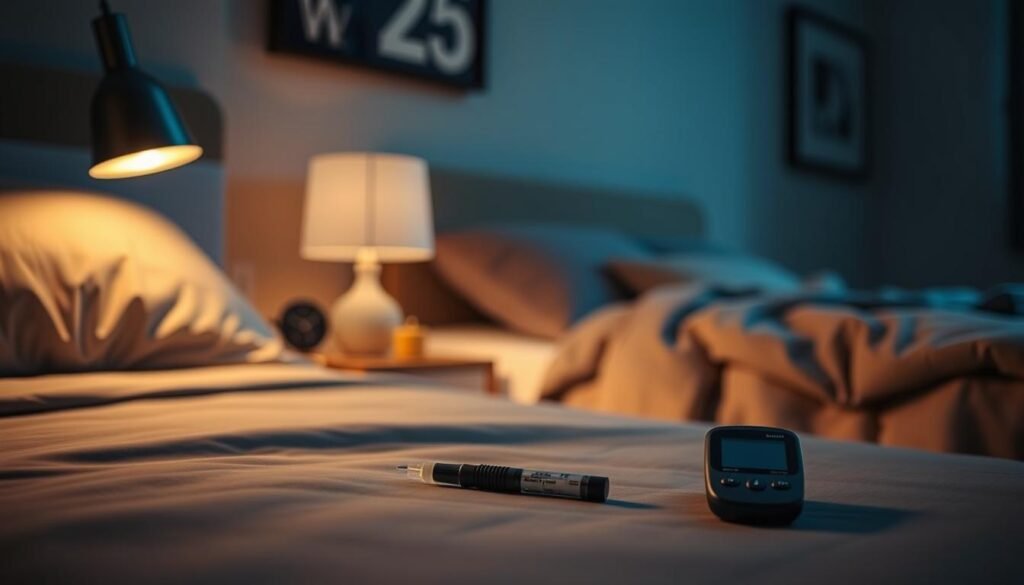About 10.5% of the U.S. population has diabetes, with many facing sleep problems. A lot of this is due to Type 2 diabetes. However, the struggle with insomnia is very real for those with Type 1 diabetes. Not getting enough sleep can lead to more health issues. This includes a higher chance of insulin resistance and diabetes complications.
A 2022 study in The Journal of Clinical Endocrinology & Metabolism found a link between diabetes and sleep disorders. People with diabetes are more likely to have insomnia and restless legs syndrome. This article will explore how Type 1 diabetes and insomnia are connected. We will look at ways to get better sleep and improve your life.
Key Takeaways
- Type 1 diabetes insomnia is common and can exacerbate diabetes complications.
- Insufficient sleep may lead to increased insulin resistance and weight issues.
- Sleep disorders like insomnia and obstructive sleep apnea are prevalent in individuals with diabetes.
- Effective sleep solutions can improve sleep quality and overall health.
- Coping strategies, such as maintaining a consistent sleep schedule, can be beneficial.
For tips on fighting chronic insomnia, check out these smart lifestyle changes that can better your sleep.
The Connection Between Type 1 Diabetes Insomnia and Sleep Disorders
Type 1 diabetes insomnia is closely related to many sleep disorders. It affects people’s overall health. About 50% of those with diabetes struggle with chronic insomnia. This issue stems from changing blood sugar levels, as both high and low levels can mess with sleep. The complex link between diabetes and sleep troubles shows the difficulties in managing this condition.
Sleep disorders, like obstructive sleep apnea (OSA), often go hand in hand with insulin resistance. The impact of diabetes includes a greater risk of these disorders. This creates a cycle where poor sleep makes diabetes harder to control. Studies show losing sleep can make diabetes and prediabetes worse. This highlights the urgent need for good sleep strategies.
Many with type 1 diabetes face sleep-related issues. These problems add to both physical and mental stress. Data shows that diabetics usually experience low sleep quality. They also face more anxiety and depression. This affects their daily lives, proving the strong link between type 1 diabetes, insomnia, and sleep disorders. Addressing these linked issues is vital for better health and life quality.
Understanding the Impact of Blood Sugar Levels on Sleep
Blood sugar levels significantly affect how well people with diabetes sleep. Changes in blood sugar disrupt sleep patterns. High blood sugar causes increased thirst and more bathroom visits, making it hard to sleep well. Conversely, low blood sugar can cause night sweats, irritation, and sometimes seizures. These issues lead to sleep problems.
Experts suggest sleeping at least seven hours nightly to keep blood sugar stable. Not sleeping enough can make the body resist insulin. This makes diabetes worse and increases the risk of complications. Sleeping less than six hours a night can make cells less responsive to insulin. It could lead to diabetes. Staying awake too long at night can also mess up the body’s biological clock. This makes insulin resistance worse.
Studies show that not getting enough sleep increases the chance of getting diabetes. This is true even when considering lifestyle choices. For those with diabetes, sleep problems like obstructive sleep apnea worsen blood sugar control. This affects sleep quality a lot.
Checking blood sugar levels often and taking steps like keeping a regular sleep schedule help. It’s also wise to avoid caffeine and other stimulants. Understanding how blood sugar and sleep affect each other is important for people with diabetes. Managing glucose well improves sleep and health. Focusing on controlling blood sugar and sleep quality helps people live healthier lives.
Common Sleep Disorders Associated with Type 1 Diabetes
People with type 1 diabetes often face sleep problems. These issues can affect their blood sugar control and health. It’s important to know about these disorders for better care.
Obstructive Sleep Apnea (OSA)
About 30% of adults with type 1 diabetes have obstructive sleep apnea. This disorder causes breathing to stop and start during sleep. This leads to poor sleep and can make blood sugar levels rise. Using CPAP machines during sleep helps keep airways open.
Restless Legs Syndrome (RLS)
Restless legs syndrome affects 21% of those with type 1 diabetes. It causes uncomfortable feelings in the legs when resting, making it hard to fall asleep. High blood sugar and low iron might make RLS worse. Managing RLS can improve sleep and health.
Night Seizures Related to Low Blood Sugar
Night seizures can happen when blood sugar drops too low. This is a big risk for people with diabetes. They might not notice these seizures. Keeping a close eye on blood sugar at night is vital. Using insulin pumps and glucose monitors helps prevent these scary events.
Sleep disorders like sleep apnea, restless legs syndrome, and night seizures show how sleep and diabetes are linked. Studies show bad sleep can hurt blood sugar control. Handling sleep issues is key for diabetes patients.
The Importance of Managing Blood Sugar for Better Sleep
Managing blood sugar is key to good sleep for people with diabetes. Studies show that when glucose levels swing, it can make sleep problems like insomnia worse. Keeping blood sugar stable helps improve sleep, which is crucial for good health.
Many adults, about one in three, find good sleep hard to come by. Diabetes plays a big part in this. Not sleeping well can make the body less sensitive to insulin. It can also make you hungrier and harder to manage your weight. That’s why controlling blood sugar is important for better sleep and managing diabetes.
Good sleep habits are important. Here are some tips:
- Establishing a consistent sleep schedule
- Creating a conducive sleeping environment
- Avoiding stimulants and electronic devices before bedtime
- Engaging in regular physical activity during the day
Doctors recommend tailored diabetes plans to keep blood sugar in check. Understanding how sleep and blood sugar affect each other can improve sleep. This leads to better diabetes control.
How Glucose Monitoring Can Aid in Sleep Quality
Monitoring glucose is key to improving sleep for those with type 1 diabetes. Continuous glucose monitors (CGMs) give real-time info on blood sugar changes. This helps spot patterns and fix issues early.
CGMs alert users to both low and high blood sugar at night. This helps keep blood sugar stable during sleep.
Sleep and blood sugar affect each other. Not sleeping enough can make blood sugar rise. Studies show people with higher blood sugar sleep worse. Managing blood sugar with monitoring helps avoid sleep problems.
Nocturnal hypoglycemia can cause sweat, restlessness, and bad dreams, hurting sleep quality. Good glucose monitoring, like the Dexcom G7 system, addresses these issues. It gives alerts so users can act early for better sleep.
Eating a balanced snack before bed can stop blood sugar drops that disturb sleep. Techniques like meditation or deep breathing also help keep sugar levels steady by reducing stress.
| Blood Sugar Levels | Effect on Sleep Quality | Monitoring Device |
|---|---|---|
| Hypoglycemia | Causes nightmares, sweating, and restlessness | Continuous Glucose Monitors (CGMs) |
| Hyperglycemia | Increased insulin resistance, potential insomnia | Real-time glucose monitoring systems |
| Stable Levels | Promotes restful sleep and recovery | Dexcom G7 |
Glucose monitoring is vital for those with type 1 diabetes to sleep well. It lets users adjust their night routines based on glucose data. This improves their sleep and health management.
Insulin Management Techniques for Better Sleep
Good insulin management is key to better sleep, especially for those with type 1 diabetes. New diabetes tech brings solutions for blood sugar control. This control can boost sleep quality.
Continuous Glucose Monitoring (CGM)
Continuous Glucose Monitoring (CGM) offers a smart way to watch glucose 24/7. These devices give live data. This data helps manage blood sugar ups and downs at night. CGMs lead to improved insulin control. This benefits overall sleep health.
Hybrid Closed Loop Systems
Hybrid closed loop systems are changing diabetes care by automating insulin delivery from glucose monitor readings. Called “artificial pancreases,” they keep glucose levels steady, cutting nighttime low blood sugar risks. Studies show this tech not only better handles blood sugar but also boosts sleep quality in type 1 diabetes.

| Insulin Management Technique | Key Benefits | Sleep Quality Impact |
|---|---|---|
| Continuous Glucose Monitoring (CGM) | Real-time glucose tracking, immediate alerts for fluctuations | Reduces overnight blood sugar disruptions |
| Hybrid Closed Loop Systems | Automated insulin delivery, stable glucose levels | Minimizes risk of hypoglycemia during sleep |
Lifestyle Adjustments to Improve Sleep Quality
Making changes in your lifestyle can greatly improve your sleep if you have type 1 diabetes. By adjusting your diet and exercise habits, you can lessen diabetes’s effect on your sleep. These changes can lead to better control of your blood sugar and overall health.
The Role of Diet in Regulating Sleep
A good diet helps manage blood sugar and sleep. It’s important to eat less caffeine and sugar in the evening. This helps avoid sleep problems at night. Eating foods high in magnesium and omega-3s can also help you sleep better.
Studies show eating too much fat and sugar might make your sleep worse. But, a diet high in fiber can make it better. Try to avoid eating big meals right before bed. Eating too much late at night can make it hard to sleep comfortably.
Exercise and Its Impact on Sleep Patterns
Regular exercise is key to sleeping well. Even short aerobic activities can improve sleep. Research shows people who exercise regularly sleep better and have more stable blood sugar levels.
Exercise helps your body’s natural sleep cycle, leading to deeper sleep. If you have type 1 diabetes, daily moderate exercise can make a big difference in your sleep quality.
To learn more about improving sleep with lifestyle changes, look for more information. Diet and exercise are vital for good sleep and managing diabetes. Read more here.
Coping Strategies for Type 1 Diabetes Insomnia
People with Type 1 diabetes often struggle with insomnia. The mix of sleep disorders and changes in blood sugar can affect their health. It’s key to use coping strategies to sleep better and manage diabetes more effectively.
Using relaxation methods like deep breathing and mindfulness meditation helps. These can ease anxiety about sleep disorders, leading to better rest. Also, having a regular sleep schedule helps. It teaches your body when to sleep and wake up.
Having support from others is crucial. Friends and family offer help and support. It’s smart to check your blood sugar before bed to avoid restlessness.
Creating a good sleep routine is another helpful step. Drink less caffeine at night, cut down on screens, and make your bedroom sleep-friendly. These changes help regulate your sleep, which is important for diabetes management.

Keeping a stable sleep schedule reduces sleep disorders. It also helps control blood sugar. Those who sleep well tend to have better A1C levels. Knowing your sleep habits is key to balancing rest and blood sugar.
| Coping Strategies | Benefits |
|---|---|
| Mindfulness Meditation | Reduces sleep-related anxiety |
| Blood Sugar Monitoring | Helps maintain overnight stability |
| Consistent Sleep Routine | Enhances sleep hygiene |
| Support Network | Provides emotional comfort and practical advice |
Adding these strategies can greatly improve health for those with Type 1 diabetes. They help manage insomnia well. This leads to better, more restful sleep.
Tips for Establishing Healthy Sleep Habits
Getting good sleep is key for those managing type 1 diabetes insomnia. A steady sleep routine can greatly enhance well-being. It also helps control blood sugar levels.
Creating a Bedtime Routine
Setting up a calming bedtime routine tells your body it’s time to relax. You can relax by:
- Reading a book
- Engaging in meditative practices
- Gentle stretching or yoga
Making these activities a nightly habit can improve your sleep. It also boosts healthy sleep habits.
Setting a Regular Sleep Schedule
Keeping a steady sleep schedule helps keep your body’s internal clock regular. Sleeping and waking at the same time every day helps:
- Facilitate a more restorative sleep
- Reinforce the body’s natural sleep cycle
- Improve management of blood sugar levels
This routine can have a good effect on your health, especially for people with type 1 diabetes.
The Role of Mental Health in Sleep Issues
Mental health plays a big role in how well we sleep. This is especially true for those with diabetes. Stress from diabetes can make it hard to fall and stay asleep. About 75% of people with depression have trouble sleeping. Anxiety also makes sleeping tough. It affects 20% of adults and 25% of teens in the US.
People with type 1 diabetes often feel stressed about their blood sugar levels. This stress can lead to mental health issues, which make sleeping even harder. Studies show that controlling diabetes well can lead to better sleep. And sleeping well helps control diabetes better.
It’s important to focus on mental health to improve sleep. Talking to professionals and joining support groups can help a lot. Stress management, like deep breathing, can improve sleep. Setting a regular sleep schedule and making your bedroom cozy are simple steps that help.

The table below shows how mental health affects sleep in those with diabetes:
| Mental Health Condition | Impact on Sleep Quality |
|---|---|
| Depression | 75% experience insomnia symptoms |
| Anxiety Disorders | Increases difficulty falling asleep |
| Post-Traumatic Stress Disorder (PTSD) | 90% of veterans with PTSD experience insomnia |
| Bipolar Disorder | Leads to significant sleep pattern changes |
| Schizophrenia | Higher likelihood of insomnia and circadian rhythm disorders |
Knowing how mental health, sleep, and diabetes are connected can lead to better health. It’s key to address these issues together. This approach can improve your life quality a lot.
Technology to Help Manage Type 1 Diabetes Insomnia
Technology plays a big part in controlling type 1 diabetes insomnia. It helps people watch how they sleep and look after their health better.
Sleep Trackers
Sleep trackers let you know more about your sleep. They:
- Track sleep stages for info on sleep cycles.
- Monitor movements during sleep to spot disturbances.
- Assess how blood sugar levels affect sleep quality.
This data helps users change their routines to sleep better. It may ease insomnia linked to managing diabetes.
Mobile Apps for Sleep Management
Many mobile apps now help with sleep management. These apps help by:
- Setting reminders to check blood sugar levels, aiding diabetes care.
- Offering ways to lessen stress and anxiety at bedtime.
- Providing guided relaxation to get ready for sleep.
These apps aim to improve sleep and diabetes care. They are great for those needing better sleep while dealing with diabetes.
| Technology Type | Functionality | Benefits |
|---|---|---|
| Sleep Trackers | Monitor sleep patterns | Identify trends for better sleep quality |
| Mobile Apps | Track sleep and glucose levels | Facilitate improved diabetes management |
| Continuous Glucose Monitoring | Real-time glucose tracking | Improve decision-making and reduce hypoglycemia risk |
| Insulin Pumps | Deliver insulin effectively | Reduce the burden of disease management |
Conclusion
Type 1 diabetes insomnia is a big challenge for people trying to stay healthy. The link between blood sugar levels, sleep problems, and mental health shows we need a full plan to manage diabetes. Studies show that kids and adults with type 1 diabetes don’t sleep as well as people without it. This affects how well they can improve their health.
Making changes to sleep can really help those dealing with this issue. Adopting a healthy diet and regular exercise, along with using tech to keep an eye on glucose, can help a lot. Getting enough sleep is essential, not just a bonus. It plays a key role in managing diabetes, affecting A1C levels and how the body uses energy.
Understanding the importance of good sleep in handling type 1 diabetes is key. Knowing how diabetes affects sleep and using specific approaches can lead to better health and life. This will help individuals boost their wellness significantly.